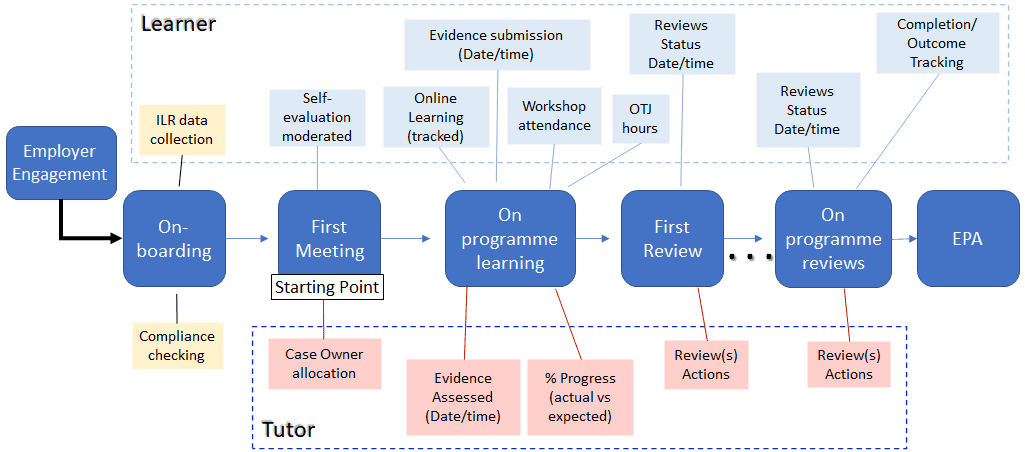The UK government has introduced an array of initiatives around employability and skills. Over the past year, and as a result of the pandemic, it produced its Plan for Jobs, followed swiftly by the Skills for Jobs white paper. This document brings together long-term policy objectives with more localised and targeted support to manage the current crisis.
The speed of policy change can be hard to navigate. So, we have put together an ‘at a glance’ guide to the keynote policies.
Skills for Jobs
Skills for Jobs is a white paper, meaning that the measures are draft policies in preparation for legislation. That means the detail is yet to come. However, it puts employers at the centre of technical skills delivery.
Here are the core areas the report covers:
 Lifelong Loan Entitlement
Lifelong Loan Entitlement
• Intended to echo provision of loans for degrees
• Equivalent of four years, post-18 education.
• Flexible, and available for a variety of skills training options.
 Apprenticeships
Apprenticeships
• Support more people into apprenticeships.
• Make them work in more sectors and allow levy-payers to transfer funds.
• Address fall in apprenticeships among non-levy payers.
• 2021-2 £2.5 billion to support apprenticeships.
• Flexible on the job training across multiple employers in a sector.
• Front loading training, accrediting of prior learning and experience, better routes of progression from traineeships and T levels to apprenticeships.
• Identify and prioritise most successful and necessary apprenticeships.
 Traineeships
Traineeships
•Plans to link to apprenticeships in growth sectors in construction and digital. The scheme will last for three years and will be delivered by providers (initially Tier 1 providers) through the Commercial Agreement for Employment and Health Related Services framework (CAEHRS).
 Maths, English and digital training
Maths, English and digital training
• Plan to focus on access for SEND people, those with Education, Health and Care Plans and English for migrants.
 Technical skills
Technical skills
• Expanding Institutes of Technology to increase higher-level qualifications in science, technology, engineering and maths (STEM). Twelve in existence, eight more planned for agreement in summer 2021.
• Continue to roll out T Levels, with a review to see how they can be more effective.
• Level 3 advanced technical qualifications to be reduced in number and aligned to T Levels.
• Reform higher technical education, so that L4/5 based on employer-led standards.
• Clear progression routes for higher technical qualifications, backed by metrics for progression outcomes.
• Employer-led digital bootcamps – £8 million for employer-led short training courses lasting 12-16 weeks. First areas for delivery are West Midlands, Greater Manchester/Lancashire, Liverpool City Region, West Yorkshire, East Midlands, and the South West.
 Adult education
Adult education
• £2.5 billion National Skills Fund to help reverse decline in adult education.
• As part of Lifetime Skills Guarantee, any adult can access a L3 fully-funded course.
• National Skills Fund – £3.5 billion, including £95 million in 2021-2 for adults to receive L3 qualification.
 Skills infrastructure
Skills infrastructure
• Government will fund the High-Value Manufacturing Catapult’s ‘Skills Value Chain’, which assesses skills needs in manufacturing and delivers programmes of study for providers. It also supports SMEs.
• Local Skills Improvement Plans will shape provision around local labour market needs. Piloted in Trailblazer local areas. Strategic funding available from 2021/22 for colleges to reshape provision as agreed with employers.
• Institute for Apprenticeships and Technical Education lead alignment of majority of post�16 technical education with employer-led standards. Call for evidence as to whether L2 can be employer-aligned and made more suitable for SEND learners.
• College Business Centres – proposals for these to be invited through the Strategic Development Fund.
• Move to multi-year funding, strengthen governance of colleges and new ministerial power of intervention for non-effective delivery or non-delivery of local skills needs.
• Funding from 2022 to test flexible and modular learning.











